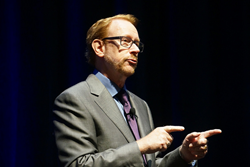Firm Management
New Training System Shows CPAs and Finance Execs How to Be Future Ready, Anticipate Disruption
In a world defined by accelerating change and complexity, the ability to anticipate disruptions, problems, client needs, and new opportunities will be the most important skill any business person can possess.
Oct. 20, 2015

In a world defined by accelerating change and complexity, the ability to anticipate disruptions, problems, client needs, and new opportunities will be the most important skill any business person can possess.
It’s a skill the team members at HORNE LLP and DeLeon & Stang, CPAs and Advisors, have taken to heart.
HORNE, a Top 50 accounting firm headquartered in Ridgeland, Miss., has become the first accounting firm in the country to train its team members with “The Anticipatory Organization: Accounting and Finance Edition,” a revolutionary new online learning system that teaches accounting and finance professionals how to anticipate future trends and take advantage of the game-changing opportunities those trends offer.
DeLeon & Stang, based in Gaithersburg, Md., has followed suit and embraced the learning system as well.
“The Anticipatory Organization: Accounting and Finance Edition,” shows CPAs and finance executives how to become more future-ready at a time when that skill is in greater demand than ever. In a recent national survey, 76 percent of small business owners say their CPAs are not proactive, and 75 percent have changed firms because their CPAs are providing reactive services rather than proactive advice. Another recent survey found that only 6 percent of CFOs, controllers and management accountants say they are future-ready.
In fact, futurist and New York Times best-selling author Daniel Burrus, who developed The Anticipatory Organization Model and Learning System, says the ability to accurately predict future trends and new opportunities is the greatest missing competency in the business world today.
“Instead of trying to meet your customers’ traditional expectations, you could predict their biggest future problems and help solve them,” said Burrus. “To create the best products and provide the best services, a company must correctly gauge what trends, environments, and situations will address their customers’ current and future unmet needs. With The Anticipatory Organization™ Model, the teams at HORNE and DeLeon & Stang are about to discover how to rise above the competition by predicting what their clients will need before they need it – and provide them with a solution at just the right time.”
“Reacting to change is no longer enough. Clients are starving for anticipatory guidance. In order to stay relevant to our clients, our firm must learn to anticipate change and help prepare for the opportunities before they arrive,” said Joey Havens, CPA, CGMA, executive partner of HORNE LLP. “We are thrilled to be able to offer our team the opportunity to learn anticipatory skills that make them future-ready and ensure that our firm will become more relevant as a trusted business advisor to our clients. The status quo of reporting as historians or simply reacting to change will only lead to the commoditization of our services, skills and knowledge.”
“These learning activities have significantly changed the way our team members think,” added Richard Stang, CPA/ABV, PFS, founding partner of DeLeon & Stang, CPAs and Advisors. “It’s no longer good enough to react to change and disruption. Our goal now is to adopt a ‘future view’ and help our clients take advantage of the opportunities that change and disruption provide.”
Following the firms’ lead, a number of state CPA societies also have partnered with The Anticipatory Organization™ to offer the training system to their members. They include the Colorado Society of CPAs, the Florida Institute of CPAs, the New Jersey Society of CPAs, and the Texas Society of CPAs.
The Anticipatory Organization Model teaches accounting and finance professionals to actively anticipate disruptions, problems, customer needs and their related opportunities, and take action to shape the future by becoming an “Anticipatory CPA.” By learning how to identify and take action on fully predictable “Hard Trends” (trends that will happen) and more easily manipulated “Soft Trends” (trends that might happen), we can elevate our relevancy in a world of transformational change.
The 28 lessons included in the learning series includes the following competencies:
— Strategic thinking
— External awareness
— Vision
— Continuous learning
— Innovation
— Creativity
— Problem-solving
— Prioritization
— Business acumen
— Decisiveness
— Influencing / persuading
— Emotional intelligence
— Consensus building
— Collaboration
— Inspiration
— Risk management
Burrus has been helping stakeholders see and shape the future for more than 30 years. The Anticipatory Organization: Accounting and Finance Edition synthesizes his approach into an “accelerated learning system” that includes a series of short, single-concept videos featuring Burrus that presents the model’s core principles. Each video is followed by a job aid and rapid-application activities that teach the learner to apply the concept to everyday activities.
This exciting new approach to learning has been customized by Burrus with input from a customer co-creation group gathered by the Maryland Association of CPAs and the Business Learning Institute. The group – representing CPAs in small to large firms, CFOs, controllers, young professionals, and other segments across the profession – has worked with the Burrus team to gather accounting- and finance-specific examples that have been built into the learning platform. This transformative learning approach will help CPAs be proactive and anticipatory in less time than traditional professional development programs.
The result is a powerful tool that will help everyone on your team know what’s next, develop opportunities, shape the future of the organization, and accelerate its success.
Get complete details about The Anticipatory Organization: Accounting and Finance Edition by visiting www.BLIonline.org/The-Anticipatory-Organization.
